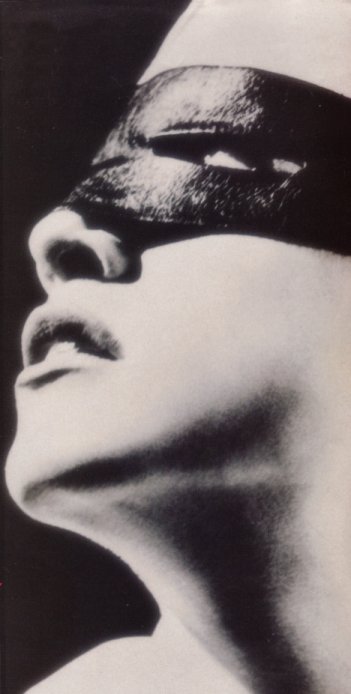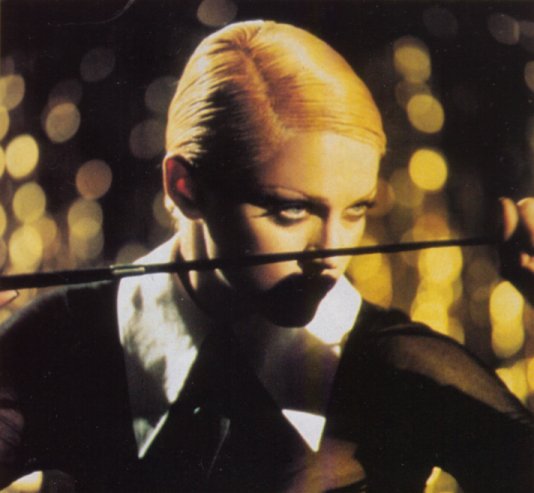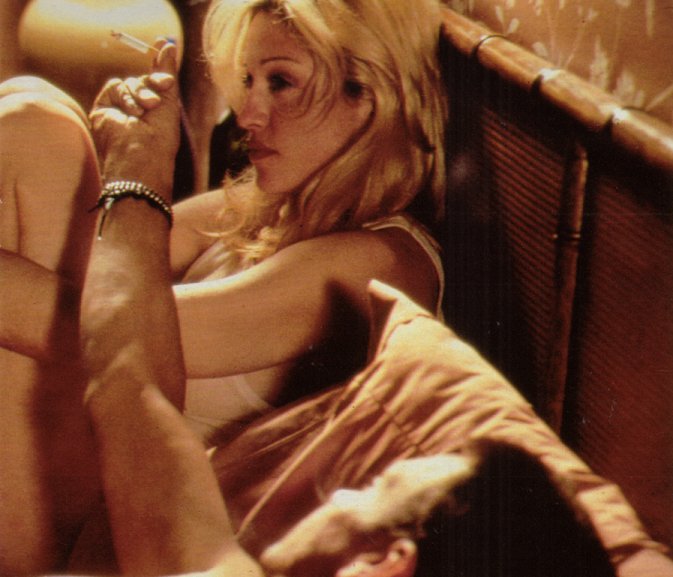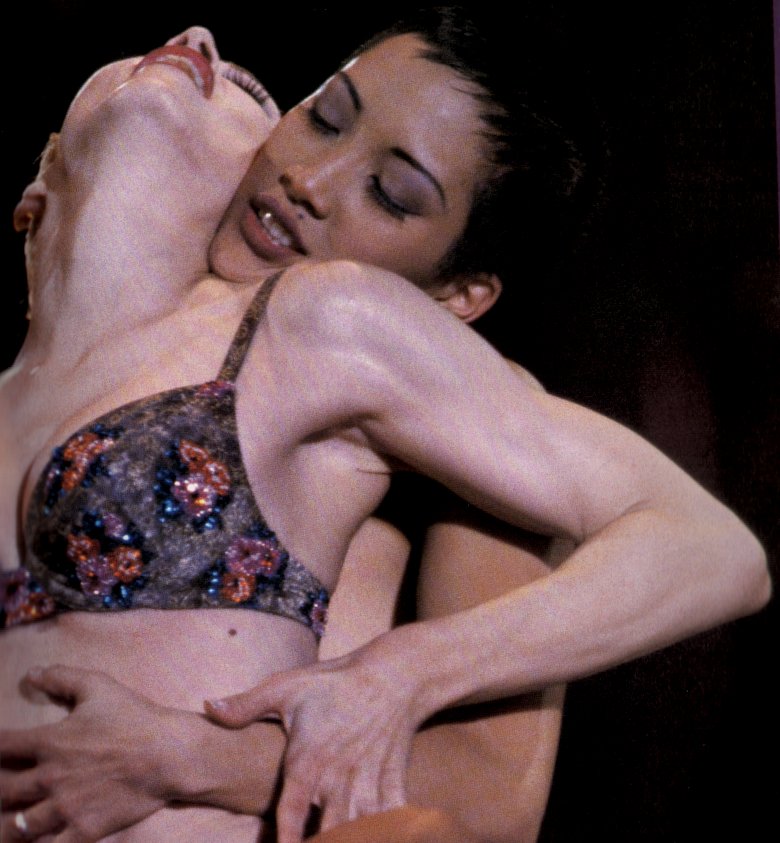 Erotica - released October 20th, 1992
Erotica - released October 20th, 1992In the era of AIDS and Reagan, Madonna was pushing sexual and feminist bounderies. By now she was untouchable and this was the first time the artist's music took on a decidedly combative, even threatening, tone. Madonna makes a socially relevant album, and few choose to listen.
I was around 17 when I bought ‘Erotica’ and of course I loved it at the time. The sexual politics and suggestive lyrics was a musical form of rebellion to my friends and I. While others sniggered at songs about oral sex and S&M, we smiled knowingly at each other because we were too liberal to be shocked.
Later on I revisited Erotica. This was while I was in college and learning about art and society and sexuality, and the album took on a whole new meaning. The album was cold and sad like a lover too often scorned to believe in romance, but still needed a good emotionally distant shag.
Now I listen to it and I have a different experience, both similar and new, shiny and new in fact. With my own sexual revolution passed and able to look back on the frivolity of my past I am able to see a little more clearly what ‘Erotica’ is (not was) about. The head fuck of romance.
 She introduces the album with “My name is Dita, I’ll be your mistress tonight.” By giving her self this guise she distances herself from the material, possibly because it too close to the raw states of her emotional vulnerability at the time, or perhaps she is playing the ultimate ringleader in the S&M circus. The title track is misleading. ‘Erotica’ the song is a song about a relationship. Take away the sexy crackle of the record player, the orgasmic moans and the throbbing pulse like bass beat and just listen, or read the lyrics and it plays differently. This is a typical story of a person using sex to gain power in a relationship, it is just presented as an S&M fantasy. We are presented with a psyche of a woman so comfortable in her sexuality, but a novice in emotional relationships
She introduces the album with “My name is Dita, I’ll be your mistress tonight.” By giving her self this guise she distances herself from the material, possibly because it too close to the raw states of her emotional vulnerability at the time, or perhaps she is playing the ultimate ringleader in the S&M circus. The title track is misleading. ‘Erotica’ the song is a song about a relationship. Take away the sexy crackle of the record player, the orgasmic moans and the throbbing pulse like bass beat and just listen, or read the lyrics and it plays differently. This is a typical story of a person using sex to gain power in a relationship, it is just presented as an S&M fantasy. We are presented with a psyche of a woman so comfortable in her sexuality, but a novice in emotional relationshipsMadonna’s cover of Peggy Lee’s ‘Fever’ comes next. Replacing the slow burning sexuality of the original with a classic house beat, Madonna turns the song from a brassy seductive admission of desire, to a distant observation of seduction as an act. Madonna is capable of sounding incredibly sexy (‘Justify my Love’) on record, and it seems she is purposely removing sex from the production and performance, and just allowing the lyrics to suggest and titillate, leaving the listener slightly perplexed as to if they should or shouldn’t not be turned on.
‘Bye Bye Baby’ is a self-inflicted mind game. Played like an answering machine message left by an ex you have done wrong by, played over a up tempo hip hop beat. You hear Madonna in her high pitched, baby doll blonde voice cooing to her lover how he has done her wrong and she is moving on.
 “What excites you? What turns you on? What makes you feel good? Does it make you feel good to see me cry? I think it does. That's why it's time to say goodbye.” Does she still want him, or is she trying to make him wish he was still with her? I have listened to many a girl friend post break up and heard the “He is no good for me!!”/”Why did it not work??” emotional confusion head fuck. Much of ‘Erotica’ plays like this. Perhaps after the failure of her relationships with Warren Beatty and Tony Ward, she needed a therapy session, and instead made an album, which would explain its schizophrenic representations of romance, relationships and sex. Or it could be that she is just trying to point out that we find it easiest to be at our most honest in the bedroom.
“What excites you? What turns you on? What makes you feel good? Does it make you feel good to see me cry? I think it does. That's why it's time to say goodbye.” Does she still want him, or is she trying to make him wish he was still with her? I have listened to many a girl friend post break up and heard the “He is no good for me!!”/”Why did it not work??” emotional confusion head fuck. Much of ‘Erotica’ plays like this. Perhaps after the failure of her relationships with Warren Beatty and Tony Ward, she needed a therapy session, and instead made an album, which would explain its schizophrenic representations of romance, relationships and sex. Or it could be that she is just trying to point out that we find it easiest to be at our most honest in the bedroom.‘Deeper and Deeper’ is the main full on dance track, and was a commercial success for the album. Flamenco guitar and a throbbing base line take this into new territory, even if it plays like part 2 to ‘Vogue’. This is one of the albums main love songs, but with a menacing undertone with the lyric “You're gonna bring your love to me, I'm gonna get you”. A fragile self-confidence of a broken woman builds, but never convinces.
 From dancing your disco tits off in a club to the jazz soaked eroticism of the boudoir of ‘Where Life Begins’. This is Madonna’s ode to the vagina and the centre of her sexuality, her pleasure and (as the title suggests) where all life begins. With Andre Betts sensual production, and Madonna purring about oral sex, you feel the lyrics, tone and production gelling like lubricant. The woman has found where she is most comfortable, in a purely sexual relationship where she knows her role. Again it is sexual honesty vs. emotional honesty, the latter being what trips most of us up.
From dancing your disco tits off in a club to the jazz soaked eroticism of the boudoir of ‘Where Life Begins’. This is Madonna’s ode to the vagina and the centre of her sexuality, her pleasure and (as the title suggests) where all life begins. With Andre Betts sensual production, and Madonna purring about oral sex, you feel the lyrics, tone and production gelling like lubricant. The woman has found where she is most comfortable, in a purely sexual relationship where she knows her role. Again it is sexual honesty vs. emotional honesty, the latter being what trips most of us up.And so we have it, all the previous psychological disorientation as a result of love/sex comes to a head with ‘Bad Girl’ an album highlight of beautiful production and one of her most intelligent songs in it’s portrayal of emotional dishonesty.
“Something's missing and I don't know why. I always feel the need to hide my feelings from you. Is it me or you that I'm afraid of?”
This is clearly a woman in conflict with the feeling of being loved as more than a sum of her physical parts. When you greet love you also greet the fear of losing that love, and it is human instinct to protect our selves by hiding unattractive attributes or by sabotage. In the case of ‘Bad Girl’ she does both. She hides her feelings and sets out to hurt her lover by being unfaithful in an ‘I’ll hurt you before you have the chance to hurt me’ type of self preservation that never protects.
 Where ‘Bye Bye Baby’ was almost playful in its execution, ‘Waiting’ treads the same territory (you did me wrong, it is over…I think) but in darker angrier shoes. “It was so easy in the beginning, when you didn't feel like running from your feelings like you are now” could this be the lover from ‘Bad Girl’ responding or the same woman not accepting blame for the failure? Perhaps it is just another variation on a theme, “I wish I could believe you, or at least have the courage to leave you”. This is the war cry of a masochist addicted to the pain, while randomly pointing blame to anyone but themselves.
Where ‘Bye Bye Baby’ was almost playful in its execution, ‘Waiting’ treads the same territory (you did me wrong, it is over…I think) but in darker angrier shoes. “It was so easy in the beginning, when you didn't feel like running from your feelings like you are now” could this be the lover from ‘Bad Girl’ responding or the same woman not accepting blame for the failure? Perhaps it is just another variation on a theme, “I wish I could believe you, or at least have the courage to leave you”. This is the war cry of a masochist addicted to the pain, while randomly pointing blame to anyone but themselves.And ‘Thief of Hearts’, a frantic brilliantly messy dance number, does just that. She sings about the failure of the relationship being the fault of an outside woman who stole her man although the man is never mentioned in the song. The hardest part of any failed relationship is admitting to yourself the part you played in its demise. Stopping yourself from being the victim, the emotional masochist, takes strength and hindsight, something not often obtainable during the initial hurt. There are those, however, who fully realise the type of relationship they are in and enjoy the mental turbulence caused by the hands of their sadist partner “Friends they tried to warn me about you, ‘He has good manners, he's so romantic but he'll only make you blue’. How can I explain to them, how could they know, I'm in love with your words?” she sings in ‘Words’, and song with such frantic strings and beats that it sounds like the musical equivalent of an emotional break down. Where does the victim end and the victimiser begin, and are they more often than not the same person?
So where does ‘Rain’ fit in? This is a love song through and through. Some will say she is using rain as a metaphor for cumming. I think it is used to literally wash away the past and start anew. In therapy this is what would be called a moment of clarity. “Here comes the sun, here comes the sun, and I say, never go away.” She has accepted love without the fear and can move on. This is also the end of this part of the albums journey. Pain is the ultimate aphrodisiac in whatever form it takes, whether it be the infliction or the taking away of it. You do not need leather whips and bondage gear to participate. All you need is two people.
 The next few songs tackle consequences and results of sex, as well as acceptance of it as a label.
The next few songs tackle consequences and results of sex, as well as acceptance of it as a label.‘Why’s it so Hard’ from the title could be a song about erectile dysfunction, but is a cry for sexual orientation to be socially accepted. In fact it is a cry for everyone to be accepted in the world “What do I have to do to be accepted, what do I have to say? What do I have to do to be respected, how do I have to play?” Madonna once again is campaigning for equality, but this time she is angry, and performs the regga influenced song with rage and urgency in her voice as she commands “Love your brother now, show your sister how!”
Like everything in life, sex has it’s consequences, and post Regan it was AIDS. Madonna herself had lost many friends to the disease, and ‘In This Life’ was her first song to speak directly on her feelings. “People pass by and I wonder who's next. Who determines, who knows best? Is there a lesson I'm supposed to learn? In this case ignorance is not bliss.” She sings over music based on George Gershwin's Prelude No. 2. The music and the lyrics are plodding and rather depressing for there is no hope suggested. This results in it being an uncomfortable listen for it is a song of despair.
‘Did You Do It?” is filler, showcasing a group Madonna was signing to Maverick records. In it guys rap about conquesting a woman over the top of Madonna’s ‘Waiting’. I guess the in joke is that most men reach climax long before women do. This track does not belong and interrupts the entire flow of the album thus far.
When we get to the last track 'Secret Garden' produced by Betts, we find an unexpected jazz house gem. Had Betts produced more songs like this who knows to what dizzying heights it could have climbed. With its shuffling beats and distant horns complimenting Madonna as she sings quietly about her desire to have a child before it is too late. Easily the sexiest moment on Erotica. we are transported to a completely different musical experience which Madonna has never taken the listener on before or since. The idea of being born again through child birth has never been put so beautifully, "There's a petal that isn't torn. A heart that will not harden. A place that I will be born, in my secret garden. I rose without a thorn, a lover without a scorn." She realises how the love she has to give can flourish and grow without the pain.

Erotica is not a master piece by any stretch of the imagination, but what it did was establish Madonna as a woman musically and socially far ahead of her time, and also as an artist challenging herself and her audience. Erotica was examining relationships from a woman’s point of view long before Alanis Morissette’s Jagged Little Pill smacked us over the head with her post feminist relationship angst, yet she was declared refreshing.
Erotica’s message in the end was too hidden beneath the hoopla of the ‘Sex’ book and ‘Body of Evidence’ to fully be appreciated at the time
For all the talk of S&M and infliction of pain as a sexual stimulant, it is emotional pain that teaches you the most about yourself, and in that, there is a certain satisfaction.
 In retrospect it is easy to see anything anew and fresh. Insights are made and so-called messages are revealed allowing us a clearer view on intentions. What I am left with is this: For all the stigma placed on bondage and S&M as an activity, in most cases it is consensual. Pain is inflicted by one lover to another for sexual stimulation and excitement. Limits are established early and trust is a big key into how the dynamic works. Any scars or bruising are physical and with time heal. The same cannot be said for the psychological pain a relationship can cause. And that, to me, is the main point of Erotica.
In retrospect it is easy to see anything anew and fresh. Insights are made and so-called messages are revealed allowing us a clearer view on intentions. What I am left with is this: For all the stigma placed on bondage and S&M as an activity, in most cases it is consensual. Pain is inflicted by one lover to another for sexual stimulation and excitement. Limits are established early and trust is a big key into how the dynamic works. Any scars or bruising are physical and with time heal. The same cannot be said for the psychological pain a relationship can cause. And that, to me, is the main point of Erotica.

6 comments:
Interesting review, but I still think this is her worst album since true blue. Lyrically it could be seen as one of her best, but the music and melody let it down so much.
curious to see what is next.
You r so wrong mate, Erotica is brilliant work and still sounds fresh 2day. Ray of Light and Like a Prayer are her most over-rated albums, while Erotica and Bedtime Stories are 4gotten about.
Love you top songs and vids!!
Thanks for taking the time to read it guys!!
I still think of it as her lost album, in every sense of the word. Lost amongst to hoopla, lost by fans and critics, and she just seemed generally lost in herself.
The great thing about her is people will argue over what her best work was for years to come.
Her best work IMO is Music. It has some of her most interesting work on there.
I never really 'got' Madonna at this stage and I really only appreciated her work once it got to Ray of Light. I can look back on some of her earlier work but it does sound a bit dated now. Still Madonna has always moved with the times. Good review though.
J
You right brilliant CD reviews. I eagerly await the next one.
Post a Comment